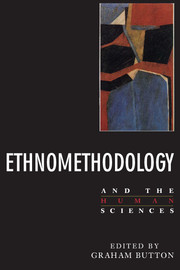Book contents
- Frontmatter
- Contents
- Contributors
- Preface
- 1 Introduction: ethnomethodology and the foundational respecification of the human sciences
- 2 Respecification: evidence for locally produced, naturally accountable phenomena of order, logic, reason, meaning, method, etc. in and as of the essential haecceity of immortal ordinary society (I) – an announcement of studies
- 3 Logic: ethnomethodology and the logic of language
- 4 Epistemology: professional scepticism
- 5 Method: measurement – ordinary and scientific measurement as ethnomethodological phenomena
- 6 Method: evidence and inference – evidence and inference for ethnomethodology
- 7 The social actor: social action in real time
- 8 Cognition: cognition in an ethnomethodological mode
- 9 Language and culture: the linguistic analysis of culture
- 10 Values and moral judgement: communicative praxis as moral order
- References
- Index
8 - Cognition: cognition in an ethnomethodological mode
Published online by Cambridge University Press: 05 June 2012
- Frontmatter
- Contents
- Contributors
- Preface
- 1 Introduction: ethnomethodology and the foundational respecification of the human sciences
- 2 Respecification: evidence for locally produced, naturally accountable phenomena of order, logic, reason, meaning, method, etc. in and as of the essential haecceity of immortal ordinary society (I) – an announcement of studies
- 3 Logic: ethnomethodology and the logic of language
- 4 Epistemology: professional scepticism
- 5 Method: measurement – ordinary and scientific measurement as ethnomethodological phenomena
- 6 Method: evidence and inference – evidence and inference for ethnomethodology
- 7 The social actor: social action in real time
- 8 Cognition: cognition in an ethnomethodological mode
- 9 Language and culture: the linguistic analysis of culture
- 10 Values and moral judgement: communicative praxis as moral order
- References
- Index
Summary
Introduction
This chapter is concerned with the exploration of the problem of analysing human cognition. Focussing upon the theoretical dimensions of this complex issue, I shall deal with some of the contemporary perspectives within which it has been conceptualised and studied. My chief aim will be to show to what extent a commitment to the exploitation of computational concepts in the field has precluded a properly sociological understanding of those properties, attributes, and capacities of people typically construed as ‘mental’ phenomena. It thus elaborates upon one of the specifications of ‘the actor’ in the human sciences that was introduced in the previous chapter. Subsequent to this demonstration, I shall seek to illustrate in what ways a specifically ethnomethodological respecification of this field is defensible, intellectually productive, and constitutes a coherent and genuinely alternative approach to a range of problems traditionally subsumed under the cognitivist rubric.
I will begin by sketching some salient aspects of the historical background to the current ‘cognitive revolution’ in the human sciences. In particular, I shall try to show on this basis how, although many proponents of cognitivism claim that it has transcended its Cartesian roots by invoking essentially ‘materialist’ understandings of the mind–brain–behaviour relationship, there still remains an undissolved Cartesian core to their ways of thinking. The alternative to this is not, contrary to some critics of cognitivism, to embrace more fully a ‘materialist’ metaphysics of the mental, but will be argued to consist in a richer appreciation of the praxiological character of cognition.
- Type
- Chapter
- Information
- Ethnomethodology and the Human Sciences , pp. 176 - 195Publisher: Cambridge University PressPrint publication year: 1991
- 29
- Cited by



